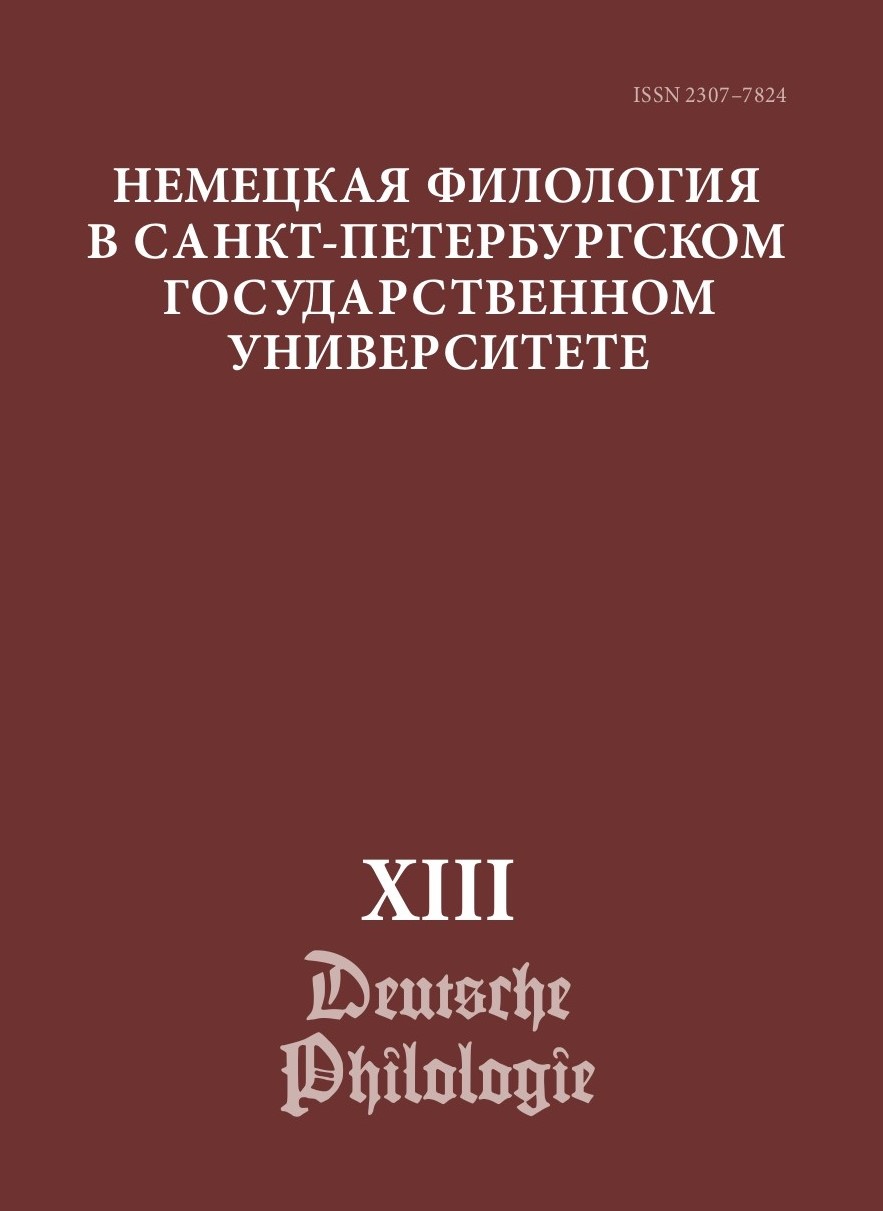MEANS OF VERBALIZATION OF THE CATEGORY OF POLITENESS IN THE GERMAN-LANGUAGE MEDIA DISCOURSE
DOI:
https://doi.org/10.21638/spbu33.2023.123Abstract
The focus of this article is the category of politeness as an important factor for the study of communicative interaction. Politeness prescribes certain forms of speech behavior which are necessary for successful interpersonal interaction. The main purpose of the article is to consider the most typical linguistic means of implementing politeness in the German media discourse. The analysis is based on such dialogic genres of public communication as analytical interview and interview-conversation. Their purpose is to influence the addressee, which implies the use of politeness. The corpus of examples is collected from the leading German-language magazines Spiegel Wissen, Spiegel and Cicero for 2015–2020 by a continuous sampling method. The situational interpretative method was used to comprehend and systematize the selected fragments expressing politeness. The methodological basis of the study was also formed by the communicative-pragmatic method since the analysis is based on the understandingof politeness as a communicative and pragmatic category aimed at achieving certain communicative and pragmatic goals in the process of communication. As a result of the research, it was revealed that in addition to the lexemes of polite semantics, the participants of the dialogue show politeness towards each other, showing interest in the topic under discussion, mutually encouraging each other to explain the previously expressed opinion in the form of a question, which acts as a polite version of the imperative. The results of the study also demonstrate the frequency of using subjunctive mood as additional means of verbalization of politeness towards the interlocutor.
Keywords:
category of politeness, communicative strategy, media discourse, successful communication, units of verbal communication
Downloads
References
Литература
Карасик В. И. Язык социального статуса. М.: Ин-т языкознания АН СССР, Волгоградский пед. ин-т, 1991. 495 с.
Ларина Т. В. Категория вежливости и стиль коммуникации: сопоставление английских и русских лингвокультурных традиций. М.: Языки славянской культуры, 2009. 512 с.
Палехова О. В. Фактор адресата в диалогическом общении // Проблемы филологии и методики преподавания иностранных языков: Сборник научных статей. Вып. 20. СПб.: С.-Петерб. гос. экон. ун-т, 2021. С. 37–40.
Шабан А. К., Хомутова Т. Н. Семиотика понятия «вежливость» в различных лингвокультурах: универсальное и культурно-специфическое // Научный результат. Вопросы теоретической и прикладной лингвистики. 2019. Т. 5. Вып. 1. С. 85–95.
Brown P., Levinson S. C. Politeness: Some Universals in Language Usage. Cambridge: Cambridge University Press, 1987. P. 348.
Held G. Politeness in linguistic research // Politeness in language: Studies in its history, theory and practice / ed. by R. Watts, S. Ide, K. Ehlich. Berlin: De Gruyter, 1992. P. 131–153.
Lakoff R. Language and woman’s place. New York: Harper and Row, 1975. 83 p.
Leech G. N. Principles of pragmatics. New York: Longman, 1983. P. 79–130.
Neuland E. Sprachliche Höflichkeit. Eine Perspektive für die interkulturelle Sprachdidaktik // Zeitschrift für interkulturelle Germanistik / Hrsg. D. Heimböckel, E. W. B. Hess-Lüttich, G. Mein, H. Sieburg. Bielefeld: Transkript Verlag, 2010. S. 9–25
Vorderwülbecke K. Höflichkeit in der Linguistik, Grammatik und DaF-Lehrwerk // Höflichkeitsstile / Hrsg. von H.-H. Lüger. Frankfurt a. M. [u. a.]: Lang, 2001. S. 27–46.
Wierzbicka A. Cross-cultural pragmatics: The semantics of human interaction / ed. by Anna Wierzbicka. 2. ed. Berlin; New York: De Gruyter, 2003. XXXVII, 502 p.
References
Brown P., Levinson S. C. Politeness: Some Universals in Language Usage. Cambridge, Cambridge University Press, 1987, 348 p.
Held G. Politeness in linguistic research. Politeness in language: Studies in its history, theory and practice, ed. by R. Watts, S. Ide, K. Ehlich. Berlin, De Gruyter, 1992, pp. 131–153.
Karasik V. I. The language of social status. Moscow, Institute of Linguistics of the USSR Academy of Sciences, Volgograd Pedagogical Institute Publ., 1991, 495 p. (In Russian)
Lakoff R. Language and woman’s place. New York, Harper and Row, 1975, 83 p.
Larina T. V. Category of politeness and style of communication: comparison of English and Russian linguistic and cultural traditions. Moscow, Languages of Slavic culture Publ., 2009. 512 p. (In Russian)
Leech G. N. Principles of pragmatics. New York, Longman, 1983, pp. 79–130.
Neuland E. Sprachliche Höflichkeit. Eine Perspektive für die interkulturelle Sprachdidaktik. Zeitschrift für interkulturelle Germanistik, hrsg. D. Heimböckel, E. W. B. Hess-Lüttich, G. Mein, H. Sieburg. Bielefeld, Transkript Verlag, 2010. S. 9–25.
Palekhova O. V. The addressee factor in dialogic communication. Problems of philology and methods of teaching foreign languages: Collection of scientific articles. Iss. 20. St. Petersburg, St. Petersburg State University of Economics Publ., 2021, Shaban A. K., Khomutova T. N. Semiotics of the concept of “politeness” in various linguistic cultures: universal and culturally specific. Scientific result. Questions of theoretical and applied linguistics, 2019, vol. 5, iss. 1, pp. 85–95. (In Russian)
Vorderwülbecke K. Höflichkeit in der Linguistik, Grammatik und DaF-Lehrwerk. H.-H. Luger (Hrsg.) Frankfurt am Main [u.a.], Lang, 2001, S. 27–46.
Wierzbicka A. Cross-cultural pragmatics: The semantics of human interaction, By Anna Wierzbicka. 2nd ed. Berlin; New York, De Gruyter, 2003. XXXVII, 502 p.
Downloads
Published
How to Cite
Issue
Section
License
Условия передачи авторских прав на статьи и рецензии, опубликованные в ежегодном периодическом издании «Немецкая филология» регулируются условиями Лицензионного Договора автора с Санкт-Петербургским государственным университетом. В соответствии с Лицензионным Договором опубликованные материалы находятся в открытом доступе, а авторам бесплатно предоставляется неограниченные возможности их распространения и самостоятельного архивирования.




